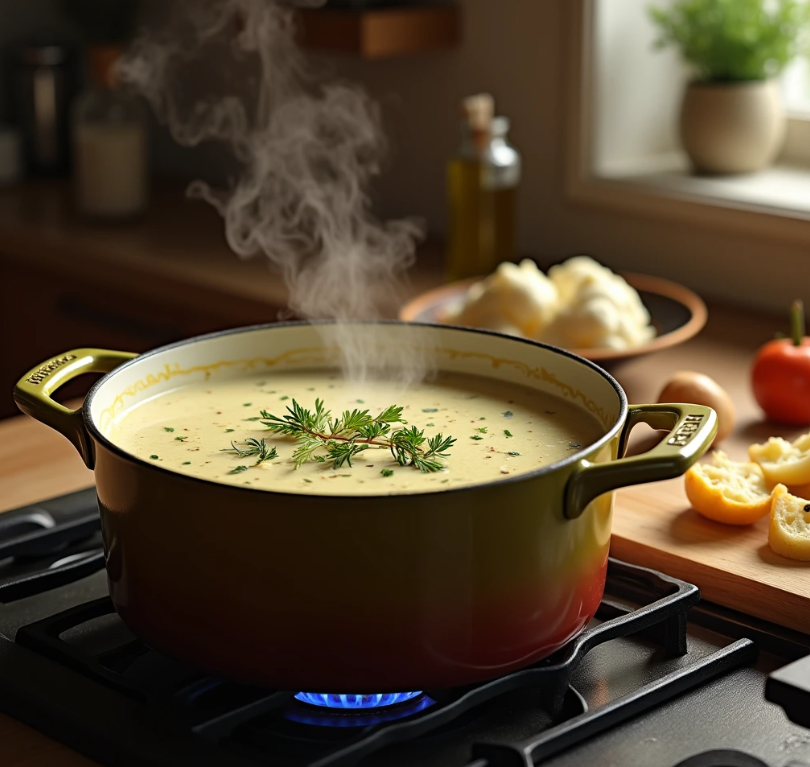Cauliflower soup is a comforting and nutritious dish, but nothing can ruin its appeal faster than an unexpected bitter taste. Whether you’re a seasoned chef or a home cook, encountering bitterness in your cauliflower soup can be frustrating. Thankfully, this common issue has identifiable causes and effective solutions. In this guide, we’ll explore why cauliflower soup tastes bitter, how to fix it, and steps to prevent bitterness in the future.
What Causes Bitterness in Cauliflower Soup?
The bitterness in cauliflower soup often stems from several factors, including the natural compounds in cauliflower, cooking techniques, and the quality of ingredients. Understanding these causes is the first step to fixing or preventing the issue.
Natural Compounds in Cauliflower
Cauliflower contains glucosinolates, natural sulfur-based compounds that can impart a bitter taste. While these compounds offer health benefits, they can become overpowering during cooking, especially if the cauliflower is overcooked or not seasoned properly.
For a more in-depth understanding of how natural compounds affect flavor, check out why bitter vegetable broths occur.
Cooking Techniques and Overcooking
Overcooking cauliflower can break down its structure, releasing more of these bitter compounds into the soup. Additionally, boiling cauliflower without proper seasoning or balancing ingredients can intensify the bitterness, as noted in this guide to bitter vegetable soups.
Ingredient Quality
Freshness matters when it comes to cauliflower. Older or overripe cauliflower tends to have a stronger, unpleasant taste. The stem and core are particularly bitter and can overpower the soup if not properly removed.
How to Fix Bitter Cauliflower Soup
If you’ve already made your soup and find it bitter, don’t worry—there are several ways to salvage it.
Adjust Cooking Techniques
- Blanch the Cauliflower: If possible, blanch cauliflower before adding it to your soup. This process helps reduce bitterness by removing excess glucosinolates.
- Shorten Cooking Time: Overcooking not only affects texture but also intensifies bitterness. Aim to cook cauliflower just until tender.
Balance the Flavors
- Add Acid: A splash of lemon juice or vinegar can counteract bitterness. Acidic ingredients balance flavors and bring brightness to the dish.
- Incorporate Fats: Cream, butter, or coconut milk can mellow the bitter notes, creating a richer and smoother soup.
- Use Herbs and Spices: Ingredients like garlic, thyme, and turmeric can mask bitterness while adding depth to the soup’s flavor.
Dilute the Bitterness
- Add Vegetables: Incorporating mild vegetables like potatoes, carrots, or parsnips can dilute the bitterness without altering the soup’s essence.
- Add Sweetness: A touch of honey or sugar can also offset the bitter notes, creating a more balanced flavor profile.
Preventing Bitterness in Future Cauliflower Soups
To avoid bitterness in your next batch of soup, take these proactive steps:
Select Fresh Ingredients
- Check for Freshness: Choose cauliflower with tight, creamy white florets and avoid heads with dark spots or a strong odor.
- Avoid the Core and Stems: These parts are naturally more bitter. Trim them off and focus on using the florets.
For additional preparation tips, explore how to enhance soup recipes.
Optimize Cooking Techniques
- Use Smaller Florets: Cutting cauliflower into small, evenly sized pieces ensures they cook uniformly without overcooking.
- Roast Before Adding: Roasting cauliflower caramelizes its natural sugars, reducing bitterness and enhancing sweetness.
Follow Balanced Recipes
- Season Generously: Always taste and adjust seasoning throughout the cooking process. Salt, pepper, and other seasonings can help balance the soup.
- Use a Tried-and-True Recipe: Recipes designed to prevent bitterness often include balanced ingredients and cooking techniques.
Nutritional Benefits of Cauliflower Despite Bitterness
Despite its occasional bitterness, cauliflower is a nutritional powerhouse. Rich in vitamins, fiber, and antioxidants, it’s worth incorporating into your diet. The glucosinolates responsible for its bitter taste are actually beneficial, offering anti-inflammatory and anti-cancer properties. When prepared correctly, cauliflower soup can be both delicious and healthy.
FAQs About Bitter Cauliflower Soup
Why does cauliflower taste bitter when boiled?
Boiling can release glucosinolates into the water, intensifying their bitter flavor. Steaming or roasting is a better alternative.
How do I fix bitter soup after it’s cooked?
Adding acid (like lemon juice), fats (like cream), or sweet vegetables can help balance the flavors.
What spices work best to mask bitterness?
Garlic, turmeric, and thyme are excellent for enhancing flavor and masking bitter notes.
Can I freeze cauliflower soup without affecting its flavor?
Yes, but freezing can sometimes intensify bitterness. Adding cream or seasoning before freezing can help maintain balance.
What other vegetables can I use for a creamy soup?
Potatoes, carrots, and butternut squash are great options for a creamy, mild-flavored soup.
For more tips on improving recipes, visit the ultimate guide to enhancing meals.
Conclusion
Bitterness in cauliflower soup doesn’t have to ruin your meal. By understanding the causes—whether it’s overcooking, poor ingredient quality, or imbalanced flavors—you can take steps to fix it or prevent it in the future. With the tips and techniques outlined in this guide, you’ll be able to create a creamy, flavorful soup that celebrates the best of cauliflower’s natural qualities.
Now it’s time to put these tips into practice. Experiment with balancing flavors, try new recipes, and enjoy the satisfaction of making a perfectly seasoned cauliflower soup that’s as delicious as it is nutritious.

